Introduction
In today’s fast-paced world, prioritizing mental health has never been more critical. With increasing pressures from work, social media, and daily life, many individuals are searching for effective and natural ways to reduce stress and find anxiety relief. The good news? You don’t need expensive therapies or medications to feel better. By incorporating a few healthy lifestyle habits into your daily routine, you can significantly improve your mental health and promote emotional resilience.
In this guide, we’ll explore five science-backed, easy-to-implement daily practices that will not only help reduce stress and anxiety but also boost your overall well-being.
Start Your Day with Mindful Breathing for Mental Health and Anxiety Relief
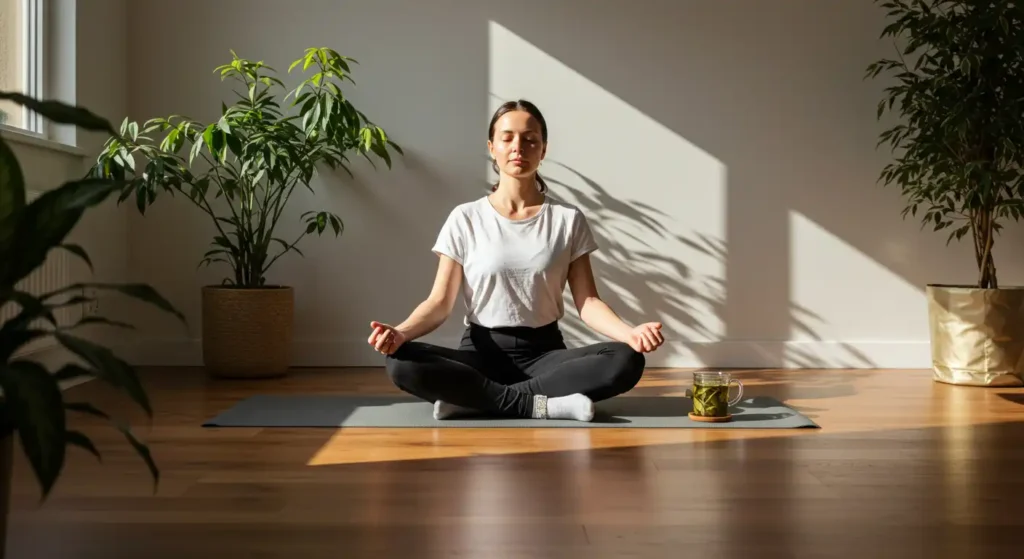
Starting your morning with mindful breathing is one of the most powerful habits you can develop to support mental health, reduce daily tension, and promote natural anxiety relief. By embracing this simple practice as part of a healthy lifestyle, you set a calm and intentional tone for the rest of your day. Whether you’re struggling with chronic stress, anxiety, or simply looking to enhance your overall well-being, mindful breathing can be a game changer.
Let’s explore how this technique works and how you can integrate it into your daily routine for long-term mental clarity and emotional balance.
How Mindful Breathing Supports Mental Health and Anxiety Relief
The Science Behind Breathing and Mental Health
Mindful breathing is more than a trendy wellness buzzword it’s a scientifically-backed technique that directly interacts with your body’s stress response system. By slowing and deepening your breath, you activate the parasympathetic nervous system, which is responsible for rest and relaxation. This shift reduces your heart rate, lowers blood pressure, and decreases cortisol the primary stress hormone.
According to Dr. Patricia Gerbarg, assistant clinical professor of psychiatry at New York Medical College, “Breathing practices can rapidly bring the body into a state of balance and calm.”1 This is particularly valuable in our modern world, where overstimulation and information overload constantly trigger our fight-or-flight response.
Additionally, studies have shown that regular deep breathing can reduce symptoms of generalized anxiety disorder and improve emotional regulation2. That’s why it plays such a crucial role in many therapeutic practices like cognitive-behavioral therapy (CBT), yoga, and meditation.
How to Practice Mindful Breathing for a Stress Reduction and Anxiety Relief
A Simple Daily Routine to Reduce Stress and Anxiety
In fact, you don’t need a meditation app or a special setting to begin reaping the benefits of mindful breathing. With just a few minutes each morning, you can therefore create a consistent, grounding ritual that supports your mental health and lays the foundation for a more healthy lifestyle.
Follow these steps:
- Find a quiet, comfortable space. Sit on a cushion or chair with your spine upright but relaxed.
- Close your eyes and take a moment to notice your natural breath without changing it.
- Inhale slowly through your nose for 4 seconds, feeling your lungs expand.
- Hold your breath for 4 seconds and observe the stillness.
- Exhale gently through your mouth for 6 seconds, releasing tension with each breath.
- Repeat this cycle for 5 to 10 minutes. You can set a timer or use calming background music if desired.
With regular practice, this technique can reduce mental fog, enhance clarity, and serve as a reliable tool for anxiety relief all while promoting a more healthy and intentional lifestyle.
The Long-Term Benefits of a Healthy Morning Breathing Habit
Integrating mindful breathing into your daily routine doesn’t just help in the moment it builds emotional resilience over time. As your nervous system becomes more balanced, you may find that stressful situations no longer feel overwhelming. Additionally, practicing breathing consistently can improve sleep quality, boost energy levels, and even enhance focus throughout the day.
By starting your day with this grounding habit, you’re not only investing in your mental health, but you’re also fostering a lifestyle rooted in calm, clarity, and self-awareness.
A Small Habit with a Big Impact on Mental Health
In a world that constantly demands our attention, choosing to start your day with intention is a revolutionary act. Mindful breathing may seem simple, but its impact on your mental health, emotional resilience, and anxiety relief is profound. By adopting this habit, you’re making a daily commitment to your well-being and embracing a more healthy lifestyle one breath at a time.
Move Your Body: Exercise and Its Role in a Stress and Anxiety Relief
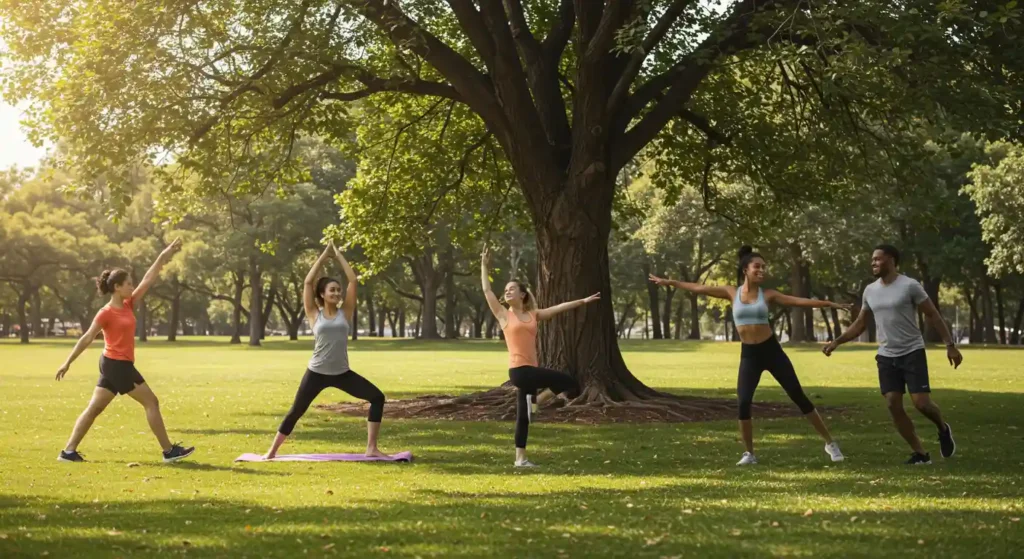
When it comes to mental health and long-term anxiety relief, one of the most natural and effective strategies is regular physical movement. Far beyond the pursuit of fitness or weight loss, exercise plays a critical role in a healthy lifestyle by improving emotional regulation, reducing stress hormones, and releasing brain chemicals that make us feel good. Even just a few minutes of movement a day can transform your mindset and resilience.
If you’re looking to build better habits, improve your mood, and take control of your emotional well-being, it’s time to move your body and feel the results.
How Physical Activity Supports Mental Health and Reduces Stress and Anxiety
The Science Behind Movement and Mental Health
Exercise is often called “nature’s antidepressant” and for good reason. Engaging in regular physical activity stimulates the release of endorphins, often referred to as the body’s “feel-good” chemicals. At the same time, exercise boosts levels of serotonin and dopamine, neurotransmitters crucial for mood regulation, motivation, and emotional stability.
According to The Anxiety and Depression Association of America states, just five minutes of aerobic exercise can begin to reduce anxiety symptoms (source). This effect is particularly valuable for individuals experiencing chronic stress, panic attacks, or general mood fluctuations.
Moreover, movement helps regulate the body’s cortisol levels the primary hormone associated with stress. High cortisol over time contributes to inflammation, fatigue, and even brain fog. Physical activity helps to reset your body’s stress response, making it easier to stay calm and grounded in challenging situations.
Daily Movement Habits to Reduce Stress and Anxiety to Support a Healthy Lifestyle
You don’t need to run marathons or hit the gym for hours to experience the mental health benefits of exercise. Consistency and variety are key. Incorporating small, intentional moments of movement into your day can reduce stress, boost energy, and contribute to lasting anxiety relief.
Morning Walks for a Fresh Start
A brisk walk in the morning clears your mind, energizes your body, and reconnects you with your environment. The combination of fresh air, natural light, and rhythmic movement helps regulate your circadian rhythm essential for healthy sleep and emotional balance. Plus, it gives you space to reflect or practice gratitude.
Stretching or Yoga to Calm the Nervous System
Incorporating gentle stretching or a short yoga flow into your routine can reduce physical tension caused by prolonged sitting or emotional stress. These practices activate the parasympathetic nervous system, promoting relaxation and improving your body awareness.
According to a study published in Frontiers in Psychiatry, yoga is particularly effective in reducing symptoms of anxiety and depression, especially when practiced regularly.
Dance Breaks to Boost Mood and Build Resilience
Need a quick reset? Turn on your favorite song and dance for 5–10 minutes. This spontaneous, joyful movement releases endorphins, elevates mood, and helps release emotional tension. It’s one of the simplest ways to reconnect with your body and reclaim your energy.
Not only are these habits accessible to anyone, but they also reinforce a healthy lifestyle while strengthening your ability to handle emotional triggers with more ease and confidence.
Move More, Stress Less – The Power of Movement in Mental Health
Integrating daily movement into your lifestyle isn’t about pushing your limits it’s about creating space for your body and mind to heal, reset, and thrive. Through walking, stretching, or dancing, you’re cultivating a habit that not only reduces stress but also supports long-term mental health and anxiety relief. Most importantly, you’re choosing a healthy lifestyle that empowers you from the inside out one step, stretch, or song at a time.
Eat for Calm: How a Healthy Diet Supports Mental Health and Reduces Stress Naturally
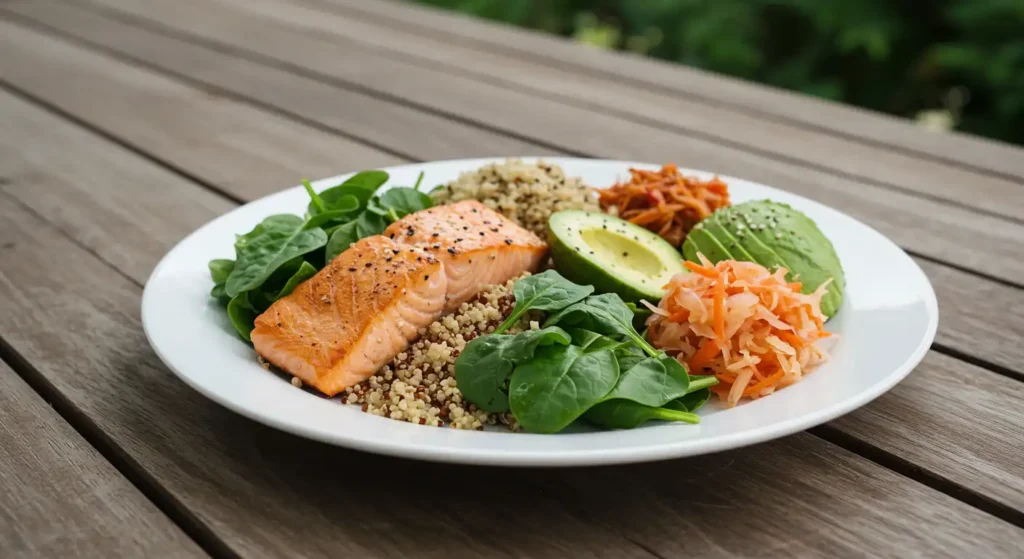
What you eat doesn’t just affect your body it profoundly impacts your brain. Embracing a healthy lifestyle through mindful nutrition is one of the most powerful and sustainable ways to reduce stress and promote lasting anxiety relief. The relationship between your diet and mental health is more intimate than you might imagine, with emerging research continually reinforcing the profound connection between food and mood.
The Gut-Brain Connection and Its Role in Mental Health
Why Your Gut Is Key to Reducing Stress
Did you know that your gut and brain are in constant communication? This communication occurs via the gut-brain axis, a complex network of biochemical signals linking your gastrointestinal system and central nervous system. Because of this, your gut is often referred to as your “second brain.”
Your digestive system houses trillions of microbes that help regulate hormones, mood, immune responses, and even sleep patterns. A healthy gut microbiome produces neurotransmitters like serotonin, which plays a key role in emotional balance. In fact, approximately 90% of your body’s serotonin is made in the gut.
A study published in Psychiatry Research found that individuals who consumed more fermented foods and fiber-rich meals experienced lower levels of social anxiety, suggesting that gut health has a direct and measurable impact on emotional well-being (source).
Foods That Enhance Mental Health and Provide Anxiety Relief
Leafy Greens – Magnesium for Mood Regulation
Leafy greens like spinach, kale, and Swiss chard are rich in magnesium, a mineral essential for calming the nervous system. Low magnesium levels have been linked to increased anxiety and irritability. Including a variety of greens in your meals helps support mental clarity and emotional balance.
Omega-3 Fatty Acids – Fuel for Brain Function
Found in fatty fish (like salmon and sardines), walnuts, flaxseeds, and chia seeds, omega-3 fatty acids are vital for brain health. They reduce inflammation in the brain, support neurotransmitter function, and have been associated with decreased rates of anxiety and depression in multiple clinical trials.
Probiotics – A Natural Ally for Gut and Mind
Fermented foods such as yogurt, kefir, kimchi, and sauerkraut contain live probiotics that feed your gut microbiome. A flourishing microbiome helps regulate stress responses, manage inflammation, and maintain a healthy immune system all of which are crucial for anxiety relief and overall mental health.
Complex Carbohydrates – Boosting Serotonin Naturally
Whole grains like quinoa, brown rice, and oats provide complex carbohydrates, which help stabilize blood sugar levels and promote the gradual release of serotonin. Unlike refined carbs that spike and crash energy, complex carbs nourish your body and brain in a steady, balanced way.
A Healthy Lifestyle Starts in the Kitchen
Maintaining a nutrient-dense and balanced diet isn’t just about physical health; it’s a proactive investment in your emotional and psychological well-being. When your body is fueled properly, your mind becomes more resilient, your mood more stable, and your ability to reduce stress and anxiety naturally is greatly enhanced.
By embracing daily nutrition habits that nurture both your gut and your brain, you’re laying the foundation for a truly healthy lifestyle one that includes joy, vitality, and emotional balance.
Let Food Be Your First Step Toward Calm and Clarity
If you’re seeking a long-term strategy for anxiety relief and stronger mental health, start by nourishing your body with intention. The foods you eat can either fuel stress or fight it. Choose wisely, eat mindfully, and let your plate reflect the healthy lifestyle you’re building one bite at a time.
Create a Screen-Free Evening Routine for a Healthy Lifestyle and Anxiety Relief
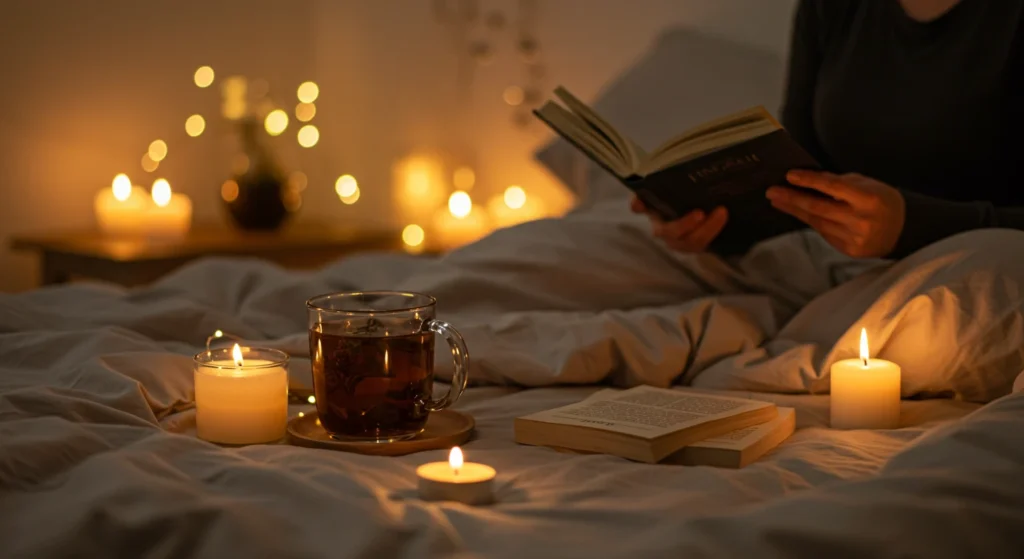
In today’s hyper-connected world, finding calm in the evening can feel nearly impossible. However, creating a screen-free evening routine is one of the most effective ways to promote mental health, improve sleep quality, and reduce stress naturally.
Why Digital Detoxing Supports Mental Health and Anxiety Relief
The Science Behind Blue Light and Sleep Disruption
Numerous studies have shown that excessive screen time especially in the hour before bed negatively affects your circadian rhythm. The blue light emitted by smartphones, tablets, and computers suppresses melatonin, the hormone responsible for regulating sleep cycles. Without adequate melatonin, falling asleep becomes harder, and sleep quality declines significantly.
According to Harvard Medical School, exposure to blue light at night reduces melatonin production and shifts circadian rhythms, leading to sleep disorders, daytime fatigue, and heightened anxiety (source).
Moreover, when your sleep is compromised, so is your ability to cope with stress. Poor sleep quality has been directly linked to increased anxiety, irritability, and poor cognitive function. Therefore, limiting screen time in the evening isn’t just good for your eyes it’s crucial for your mental health.
How to Build a Healthy Lifestyle with a Screen-Free Evening Routine
Mindful Steps to Reduce Stress Before Bed
Designing a screen-free evening doesn’t mean going cold turkey immediately. Instead, aim for a gradual shift by incorporating small, calming activities that ground you and bring pleasure without digital stimulation.
Here’s how you can create a routine that enhances mental clarity, lowers stress hormones, and invites anxiety relief naturally:
- Power Down Early: Turn off all electronic devices at least one hour before bed. This gives your brain time to adjust and signals your body that it’s time to rest.
- Read a Physical Book or Journal: Replace scrolling with a physical book or a gratitude journal. Journaling before bed helps process your thoughts, reduce mental clutter, and promote emotional regulation.
- Use Blue Light Filters If Necessary: If avoiding screens altogether isn’t possible, install blue light filters or use “night mode” settings to lessen the impact on melatonin production.
- Create a Calming Ritual: Light some candles, sip herbal tea, or enjoy aromatherapy with lavender or chamomile essential oils. Gentle stretching or breathing exercises can also signal your nervous system to relax.
- Dim the Lights: Keep lighting warm and low after sunset to encourage natural melatonin production.
The Long-Term Benefits of an Evening Digital Detox
Incorporating a screen-free routine not only improves your sleep quality but also enhances your emotional resilience and self-awareness. When practiced consistently, this simple shift supports a more balanced lifestyle, helps regulate your mood, and contributes to long-term anxiety relief.
Make Sleep a Cornerstone of Your Healthy Lifestyle
A good night’s sleep is not a luxury it’s a biological necessity. Prioritizing a screen-free routine is a small yet transformative habit that leads to greater mental clarity, lower stress levels, and an improved overall sense of well-being.
By giving your mind a break from constant stimulation, you’re creating space for reflection, relaxation, and restoration all key components of a healthy lifestyle rooted in mental health and emotional balance.
Disconnect to Reconnect
Indeed, the path to better mental health starts with simple, intentional choices. While unplugging from screens each night may seem like a small habit, its impact on your mind and body is profound. Therefore, create an evening sanctuary where peace replaces noise, and calm becomes your new normal. Make space to breathe, reflect, and reset one night at a time.
Practice Gratitude and Journaling for Long-Term Mental Health and Anxiety Relief
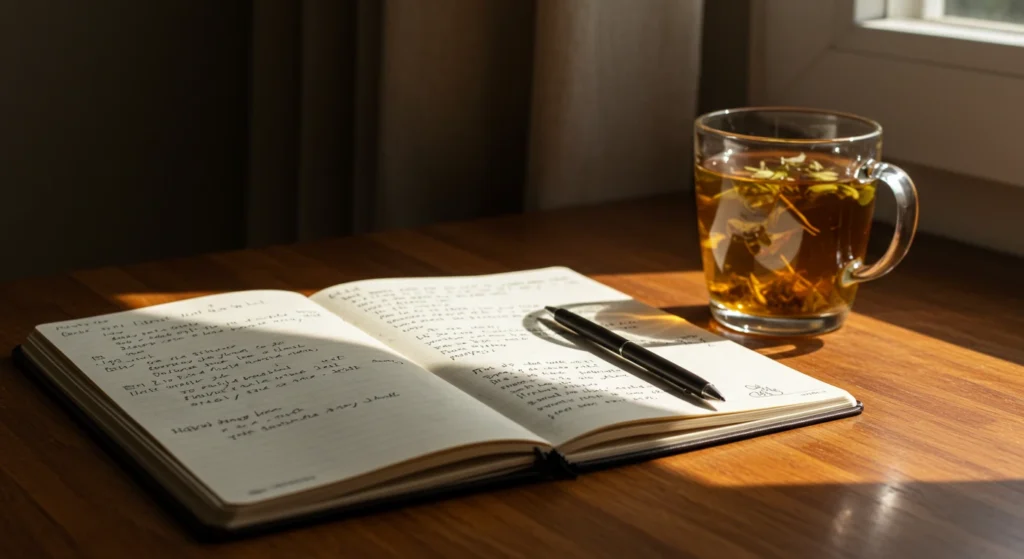
Incorporating gratitude and journaling into your daily routine may seem simple, but their impact on your mental health is profound. These habits help regulate emotions, increase self-awareness, and reduce stress and anxiety contributing to a more resilient and healthy lifestyle. When practiced regularly, they serve as powerful tools for anxiety relief and emotional stability.
The Psychological Power of Gratitude to Reduce Stress and Anxiety and Improve Mental Health
How Gratitude Rewires the Brain
Scientific research continues to validate what many mindfulness practitioners have long known: gratitude changes your brain. A study published in Frontiers in Psychology found that people who regularly practiced gratitude experienced increased activity in the medial prefrontal cortex a region responsible for managing emotions, empathy, and decision-making.
According to the study, individuals who kept a gratitude journal showed greater neural sensitivity to gratitude experiences, which helped them feel more positive emotions and engage in healthier behaviors. This emotional shift fosters optimism, strengthens relationships, and builds a buffer against daily stressors.
As neuroscientist Alex Korb, Ph.D., explains in The Upward Spiral, “Gratitude boosts dopamine and serotonin, the brain’s feel-good chemicals, and activates the brain stem to produce dopamine. It’s like your brain is saying: ‘Yes, keep doing that!’”
Journaling Habits That Support a Healthy Lifestyle and Provide Anxiety Relief
Evening Gratitude Journal
Before going to bed, write down three things you’re thankful for—no matter how small. This practice shifts your focus from what went wrong to what went right. Over time, this rewiring effect promotes a more positive mindset, which is essential for both emotional and mental health.
Examples:
- A peaceful morning walk
- A kind word from a friend
- Completing a difficult task
Morning Intentions for a Mindful Start
Alternatively, setting a calm and focused tone in the morning helps you stay grounded throughout the day. Write a short intention or affirmation that aligns with how you want to feel or behave.
Examples:
- “I choose patience and clarity today.”
- “I will respond with kindness, not react in haste.”
- “My peace is my priority.”
Use a Stress Log for Emotional Clarity
Whenever you feel anxious or overwhelmed, jot down your thoughts and feelings. Identifying patterns in your triggers can empower you to change your reaction to them. Over time, this practice fosters emotional intelligence, enhances decision-making, and brings about sustainable anxiety relief.
Why Gratitude and Journaling Are Essential for Long-Term Mental Health
The real power of these habits lies in their consistency. By making gratitude and journaling a non-negotiable part of your daily life, you build emotional resilience and foster self-compassion two key components of lasting mental health.
Furthermore, these techniques are free, accessible to everyone, and can be practiced anywhere. Whether you use a leather-bound journal or a simple notebook, what matters is your willingness to reflect, acknowledge, and grow. This simplicity makes them some of the most effective tools in your emotional wellness toolkit.
Write Your Way to a Healthier, Calmer Life
When it comes to improving your mental health and achieving anxiety relief, few practices are as simple and transformative as gratitude and journaling. They don’t require equipment, apps, or subscriptions just presence and intention. By making space each day to reflect and appreciate, you’re actively choosing a more healthy lifestyle, full of meaning, calm, and emotional freedom.
Conclusion: A Healthy Lifestyle is Your Best Mental Health Investment
By adopting these five simple daily habits mindful breathing, movement, nourishing foods, screen-free evenings, and gratitude journaling you’re taking tangible steps to support your mental health naturally.
Each practice works synergistically, helping to reduce stress, promote anxiety relief, and build a truly healthy lifestyle that supports your emotional, physical, and spiritual well-being.
Remember, small changes lead to big transformations. Don’t aim for perfection aim for consistency.






